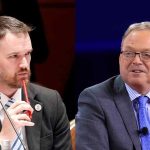
Barbados has officially broken up with the British monarchy, but both sides have agreed to remain friends.
Dame Sandra Mason, who served as Governor-General under the monarchy, has been sworn in as the first President of Barbados.
Barbados will remain part of the Commonwealth, but will no longer be a Commonwealth realm.
Here’s what you need to know.
Barbados becomes a republic
At the stroke of midnight on the 55th anniversary of its independence, Barbados became a republic.
A 21-gun salute fired as the national anthem of Barbados was played over a crowded Heroes Square in Bridgetown.
Prince Charles sombrely watched as The Queen’s Standard was lowered and fireworks were let off around the island.
The celebration, including Barbadian music and dance, began at 8pm on Monday (11am Tuesday AEDT) and the inauguration was just after midnight.
Prime Minister Mia Amor Mottley, the leader of Barbados’ republican movement, helped lead the official ceremony.
Ms Mottley has won global attention by denouncing the effects of climate change on small Caribbean nations.
A message from Her Majesty
The Queen sent a message with her “warmest good wishes” to Ms Mason and all Barbadians.
“As you celebrate this momentous day, I send you and all Barbadians my warmest good wishes for your happiness, peace and prosperity in the future,” HRH said.
She went on to describe the first time she set foot on the island and her pride in how it has continued to shine and succeed.
Colonial past
Barbados has been under British rule for some 400 years, including more than 200 years of slavery.
An English ship claimed it for King James I in 1625 and it became a focus of the brutal trans-Atlantic slave trade, with African slaves forced to work the island’s sugarcane fields.
In 1966, Barbados became independent, but Queen Elizabeth remained its head of state – until now.
In 2020, Ms Mottley announced Barbados would oust the monarchy, saying while she has great respect for the Queen, “the time has come to fully leave our colonial past behind”.
Farewell, Prince Charles
Prince Charles was invited to attend the Republic Celebration events as guest of honour and was awarded the Order of Freedom of Barbados.
His attendance sends a message of continued friendship and suggests Britain has not been ‘cast aside’, according to the BBC.
During his speech, Prince Charles “reaffirmed” the parts of their relationship that would not change.
“For example, the close and trusted partnership between Barbados and the United Kingdom as vital members of the Commonwealth,” he said.
Commonwealth member v Commonwealth realm
A Commonwealth realm is a country whose head of state is Queen Elizabeth II.
By electing a president and becoming a republic, Barbados no longer meets this criterion.
But it has decided to remain part of the Commonwealth as a voluntary member.
Barbados will become the first country to remain a member having ceased to be a constitutional monarchy, according to UK Parliament.
In the past, countries have needed to reapply for membership after leaving, but several republics are members.
“The Commonwealth is a voluntary association of 54 countries, which work together towards shared goals in democracy and development,” Clarence House said in a statement.
- Click here for a full list of its members
Not all sweet goodbyes
Activist David Denny celebrated the creation of the republic but said he opposed the visit by Prince Charles, noting the royal family for centuries benefited from the slave trade.
“Our movement would also like the royal family to pay a reparation,” Mr Denny said.
The royal family has not offered a formal apology for its history of slavery and colonialism in the region.
‘Shine, like a diamond’
During the ceremony, singer and entrepreneur Rihanna was honoured as a National Hero of Barbados.
“May you continue to shine like a diamond and bring honour to your nation by your words, by your actions and to do credit wherever you shall go,” Ms Mottley said.
What will change?
This is a break up, but the island nations have agreed to remain close friends.
Barbados will still be part of the Commonwealth, but will no longer consider Queen Elizabeth II or her successors its head of state.
In addition to holding presidential elections, Barbados will no longer hang framed portraits of the Queen in government buildings and her insignia will no longer appear on the uniforms of government workers.
What it means for the realm
Barbados is following other Caribbean nations that have dispensed with the Queen, including Guyana in 1970, Trinidad and Tobago in 1976 and Dominica two years later.
The last time the Queen was removed as head of state was in 1992 when Mauritius, an island in the Indian Ocean, proclaimed itself a republic.
Barbados was one of her 16 realms, others in the Caribbean include Antigua and Barbuda, Bahamas, Belize, Grenada, Jamaica, Saint Kitts and Nevis, Saint Lucia and St Vincent.
The shift may spur discussion of similar proposals in other former British colonies that have the Queen as sovereign, which include Jamaica, Australia and Canada.
-with agencies
The post Here’s what has changed now that Barbados has ousted the Queen appeared first on The New Daily.
Powered by WPeMatico






